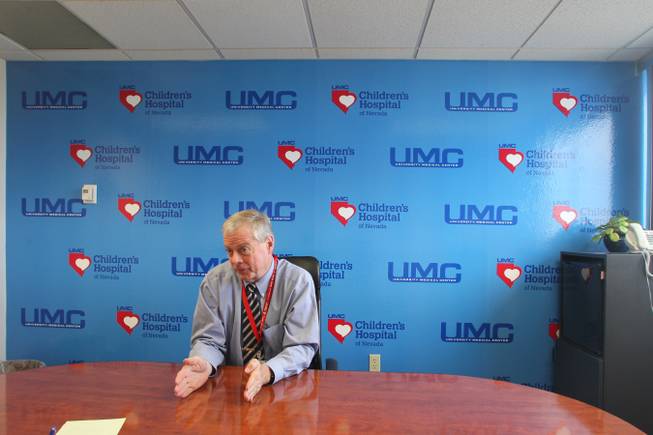
UMC CEO Brian Brannman speaks about implementing his hospital’s new computer system and other issues Wednesday, Nov. 20, 2013.
Saturday, Nov. 23, 2013 | 2 a.m.
While the Affordable Care Act has been making headlines for its effect on consumers, hospitals are also making changes to comply with the new law.
At University Medical Center, one of the biggest changes is in the installation of a new electronic health record that will help collect and share information across the entire organization.
The Clark County-owned public hospital began installing the software system late last year and began a second phase integrating clinical operations in September. It has until 2017 to meet the deadline imposed by the Affordable Care Act; if it doesn’t, reimbursement rates for Medicare patients treated at UMC would be cut.
UMC CEO Brian Brannman is confident the organization will easily meet its deadline and anticipates the system will be fully rolled out within 18 months. The process has been slow-going due to its complexity, Brannman said, and will cost the hospital about $45 million total — $27 million for the software and $18 million in installation and training costs.
The Sun sat down with Brannman to talk about UMC’s electronic health record, other ways the Affordable Care Act is affecting the hospital and a possible Las Vegas medical school.
Why is UMC installing the electronic health record?
It’s something everybody’s got to do. A big part of the Affordable Care Act is there’s an incentive payment system for health care providers to establish what they call "meaningful use" — minimum standards for things that have to be automated like electronic order entry. The downside of that is if you don’t implement it by 2017, then you begin to see your Medicare reimbursement rates reduced. You really don’t have the option of opting out.
How will it affect the hospital?
I think what’s important for us, electronic health records offer all kinds of opportunities for improving the quality of care. Delivering health care is a science, and the more data you have, the better you are able to deliver care.
You settle disputes about which drugs are most efficacious, which treatment protocols are most efficacious. It’s not cookbook medicine; it’s using the data to drive you toward the best solutions and outcomes for the patient.
What’s the status of the implementation?
The first stage we implemented was to put in the back-office functions, the finance and the record-keeping.
In September, we began the real serious work on the electronic order entry piece. We’re rolling that out now. It’s still in an early stage — anytime you do this with any system, there’s some hiccups. You’re talking about 4,000 people in the hospital. We’ve got 1,200 nurses and over 1,200 doctors in the community that use UMC, (and) you’re changing their work practices. It’s a culture change, and these are very complex systems.
How will it work when it’s in place?
It will go across the entire organization. A primary care provider at one of our outpatient clinics would be able to have complete visibility of everything that happened to you on the inpatient side. If you had a colonoscopy, he’ll be able to pull up the photos the doctors took, all the X-rays and lab results could be looked at. It’s a lot easier to have consistency in the care.
It makes it more difficult for tests to not be done or for the results to be overlooked.
How else is the Affordable Care Act affecting UMC?
The population that’s served at our indigent care clinic has traditionally been through Clark County Social Services. That patient population is going to roll to Medicaid, which has a lower reimbursement rate. At the end of the day, that’s part of our safety-net mission and it’s just a matter of adjusting. We’re also working to ensure that we educate folks about their choices. We want to help them determine whether they’re part of the expanded Medicaid population or whether it makes more sense for them to find a plan on the health insurance exchange. We want to try and get as many people covered as we can.
Where does UMC fit in proposed plans to bring a medical school to Las Vegas?
I’m excited about it. It seems as though we’ve gotten over some of our traditional north-south business and now are really focused on how do we get that four-year campus here. How do we grow it and expand the number of residency programs so that we’re really producing a volume of high-quality physicians?
We’ve already been working with UNLV on the nursing, hospital administration and public health side. I think pulling them into the conversation on the physician piece really helps us to start rounding ourselves out as a true academic medical center.


Join the Discussion:
Check this out for a full explanation of our conversion to the LiveFyre commenting system and instructions on how to sign up for an account.
Full comments policy